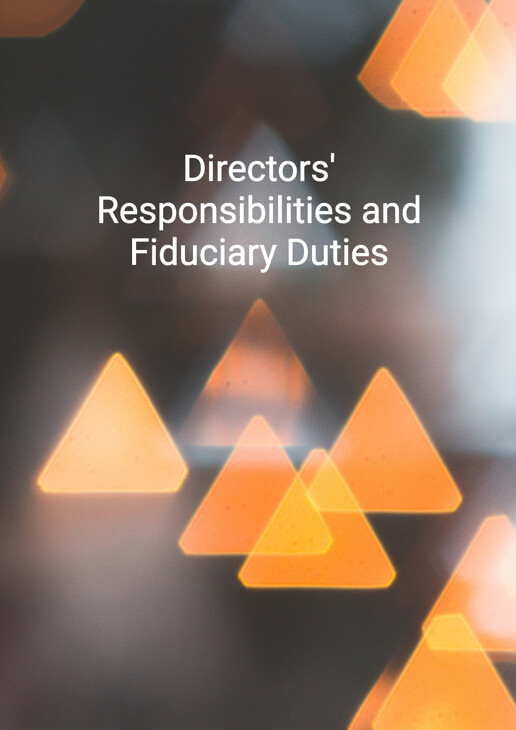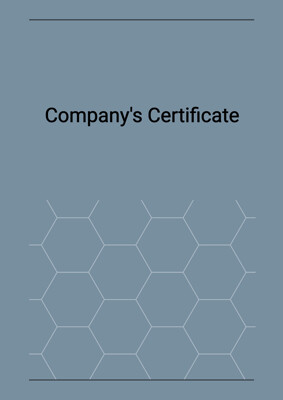How to Tailor the Document for Your Need?
01
Create Document
Click "Create Document" button and the document will be prepared with your account details automatically filled in.
02
Fill Information
Please fill in any additional information by following the step-by-step guide on the left hand side of the preview document and click the "Next" button.
03
Get Document
When you are done, click the "Get Document" button and you can download the document in Word or PDF format.
04
Review Document
Please review the document carefully and make any final modifications to ensure that the details are correct before publication / distribution.
Document Preview
Document Description
The document titled 'Directors' Responsibilities and Fiduciary Duties' is of utmost importance for any company as it outlines the essential obligations and duties that directors must fulfill in order to act in the best interest of the company and its shareholders. The document provides a comprehensive overview of each duty and responsibility, ensuring that directors are aware of their legal and ethical obligations.
The document is divided into multiple sections, each focusing on a specific duty or responsibility. The first section emphasizes the duty to act in good faith for the benefit of the company as a whole. Directors are required to prioritize the interests of all shareholders, both present and future, and strive for fair outcomes among members.
The second section highlights the duty to use powers for a proper purpose for the benefit of members as a whole. Directors must exercise their powers solely for the benefit of the company and not for personal gain or to gain control of the company. This duty applies even if the director is acting in good faith.
The third section emphasizes the duty not to delegate powers except with proper authorization and the duty to exercise independent judgment. Directors must exercise their powers independently and in accordance with the company's memorandum and articles of association. Delegation of powers should only occur with proper authorization.
The fourth section focuses on the duty to exercise skill, care, and diligence. Directors are expected to exercise reasonable skill, care, and diligence in performing their duties, taking into account their knowledge, skills, and experience.
The fifth section highlights the duty to avoid conflicts of interest. Directors must ensure that their personal interests do not conflict with the interests of the company.
The sixth section outlines the duty not to enter into transactions in which directors have an interest, subject to compliance with laws and regulations. Directors with a material interest in a transaction involving the company must disclose their interests and abstain from voting. Transactions must also comply with the law and may require approval from other directors or members.
The seventh section emphasizes the duty not to profit from the position of a director. Directors must not seek personal benefits or use confidential information for personal gain at the expense of the company.
The eighth section focuses on the duty not to make unauthorized use of the company's property or information. Directors must not use company property or information without authorization and should not take advantage of opportunities arising from their position as a director.
The ninth section highlights the duty not to accept any personal benefit from third parties resulting from the position of director. Directors should not accept benefits from third parties unless approved by the company or necessary for the proper performance of their duties.
The tenth section emphasizes the duty to observe the company's memorandum and articles of association and resolutions. Directors must comply with the company's governing documents and any resolutions made in accordance with those documents.
The eleventh and final section focuses on the duty to keep proper books and records. Directors must ensure that accurate and comprehensive account books are maintained to reflect the company's financial situation and transactions.
Overall, this document serves as a crucial guide for directors, providing detailed explanations of their responsibilities and fiduciary duties. By adhering to these duties, directors can contribute to the success and integrity of the company.
How to use this document?
To effectively use the 'Directors' Responsibilities and Fiduciary Duties' document, follow the step-by-step guidance below:
1. Familiarize yourself with the document: Read the entire document carefully to understand the importance of directors' responsibilities and fiduciary duties in the context of a company.
2. Understand each section: Pay close attention to each section of the document, as they outline specific duties and responsibilities. Take note of the key points and legal obligations mentioned in each section.
3. Act in good faith for the benefit of the company: Ensure that all decisions and actions as a director are made in good faith and for the overall benefit of the company and its shareholders.
4. Exercise powers for a proper purpose: Use your powers as a director solely for the benefit of the company and not for personal gain or to gain control of the company. Seek proper authorization for any delegation of powers.
5. Exercise independent judgment: When exercising your powers, make independent judgments based on the company's memorandum and articles of association. Avoid delegating powers without proper authorization.
6. Exercise skill, care, and diligence: Act with reasonable skill, care, and diligence in performing your duties as a director. Stay updated with the knowledge, skills, and experience necessary for your role.
7. Avoid conflicts of interest: Ensure that your personal interests do not conflict with the interests of the company. Make decisions that prioritize the company's well-being.
8. Disclose and abstain from transactions with personal interests: If you have a material interest in a transaction involving the company, disclose it and abstain from voting. Ensure that all transactions comply with laws and regulations.
9. Do not profit from your position: Avoid using your directorship for personal gain or to harm the interests of the company. Do not use confidential information for personal advantage.
10. Obtain proper authorization for company property and information: Do not use company property or information without proper authorization. If there is a need to use or benefit from such property or information, disclose it to the company and obtain approval.
11. Do not accept personal benefits from third parties: Refrain from accepting benefits from third parties resulting from your position as a director, unless approved by the company or necessary for the proper performance of your duties.
12. Comply with the company's governing documents: Observe and comply with the company's memorandum and articles of association. Adhere to any resolutions made in accordance with these documents.
13. Maintain proper books and records: Take all necessary steps to ensure that accurate and comprehensive account books are kept, reflecting the company's financial situation and transactions.
By following these steps and adhering to the duties and responsibilities outlined in the document, you can fulfill your role as a director effectively and contribute to the success and integrity of the company.
Not the right document?
Don’t worry, we have thousands of documents for you to choose from:







